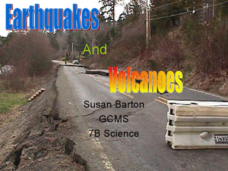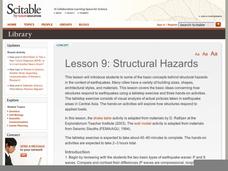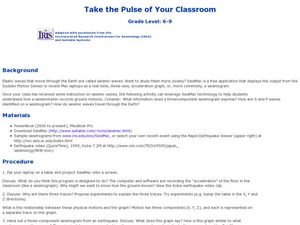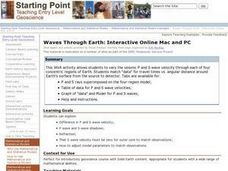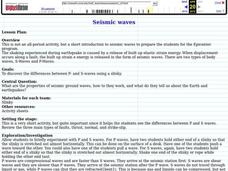Curated OER
Regents High School Examination: Physical Setting Earth Science 2008
Throughout this earth science exam, high-school geologists complete a series of multiple choice and short answer questions about the solar system, atmosphere, and earth system. This is an amazing test, as are all of the exams developed...
Curated OER
Regents High School Examination: Physical Setting Earth Science 2009
Junior geologists address 50 multiple choice questions and 35 short answer questions about the earth system. Plenty of visuals are included for interpretation: diagrams, graphs, maps, photographs, laboratory setups, weather symbols, and...
Curated OER
Regents High School Examination: Physical Setting Earth Science 2010
Every topic under the sun is covered in this New York State Regents High School Examination. With the focus of earth science, participants answer 85 quesitons about the solar system, geologic time, rocks and minerals, landforms, and...
Curated OER
USGS Seismometer
A large black-line diagram of a seismometer fills this page. It is not a worksheet, but rather an explanation of how a seismometer works. You could make a transparency of it or display it via a video screen when teaching about...
Curated OER
Earthquakes and Volcanoes
Nice pictures, maps and informative diagrams are incorporated into this PowerPoint about earthquake types and the types of waves carrying energy produced. There are a number of pages explaining scientific terminology and diagrams...
Nature
Structural Hazards
The scientific explanation of seismic waves is detailed in the introduction. A fictional scenario is also provided for your class to discuss. Pictures and handouts that are meant to be included, however, they are not accessible....
Curated OER
Seismic Waves
High schoolers work together to discuss seismic waves. Using seismograph records, they practice determining where the epicenter of the earthquake was located. They identify and illustrate the three types of waves and how the records can...
Curated OER
Take the Pulse of Your Classroom
Learners discuss seismic waves. In this science lesson plan, students investigate the acceleration of the floor in the classroom similar to a seismograph. Learners observe a three-component seismogram from an earthquake and determine...
Curated OER
Earthquakes
Students inspect the causes and effects of earthquakes and examine how seismic waves travel. In this earthquake lesson, students determine where earthquakes happen and why, before determining how to build an earthquake resistant...
Curated OER
Seismic Waves
In this seismic waves learning exercise, students read and study the science of earthquakes using online resources to complete 8 short answer questions.
Curated OER
GED Vocabulary: Earth and Space Science
For this earth and space science GED worksheet, students complete a crossword puzzle given 7 clues about topics such as earthquakes, the Milky Way Galaxy and weathering and erosion. Students are given a word bank to use to complete the...
Curated OER
Earthquake Information
In this earthquake worksheet, students complete a crossword puzzle by determining the terms associated with the 8 given clues.
Curated OER
Earthquake Waves
In this waves activity, students read about the different types of waves associated with earthquakes. Then students complete 1 fill in the blank and 2 short answer questions.
Curated OER
Earth Science: In Depth Look at Earthquakes
Learners engage in an interactive Internet instructional activity covering the reasons and results of earthquakes. After reading eyewitness accounts and viewing animations, they use seismograms to measure and locate the epicenters. In an...
Curated OER
Waves Through Earth: Interactive Online Mac and PC
Students participate in a JAVA activity to vary the seismic P and S wave velocity through each of four concentric regions of Earth. They match "data" for travel times vs. angular distance around Earth's surface from the source to detector.
Curated OER
Being P-Waves and S-Waves
Students participate in a demonstration in which they, themselves, represent seismic P-waves and S-waves.
Curated OER
Seismic waves
Students discover the differences between P- and S-waves using a slinky. They see that when displacement occurs along a fault, the built up strain of energy is released in the form of seismic waves.






